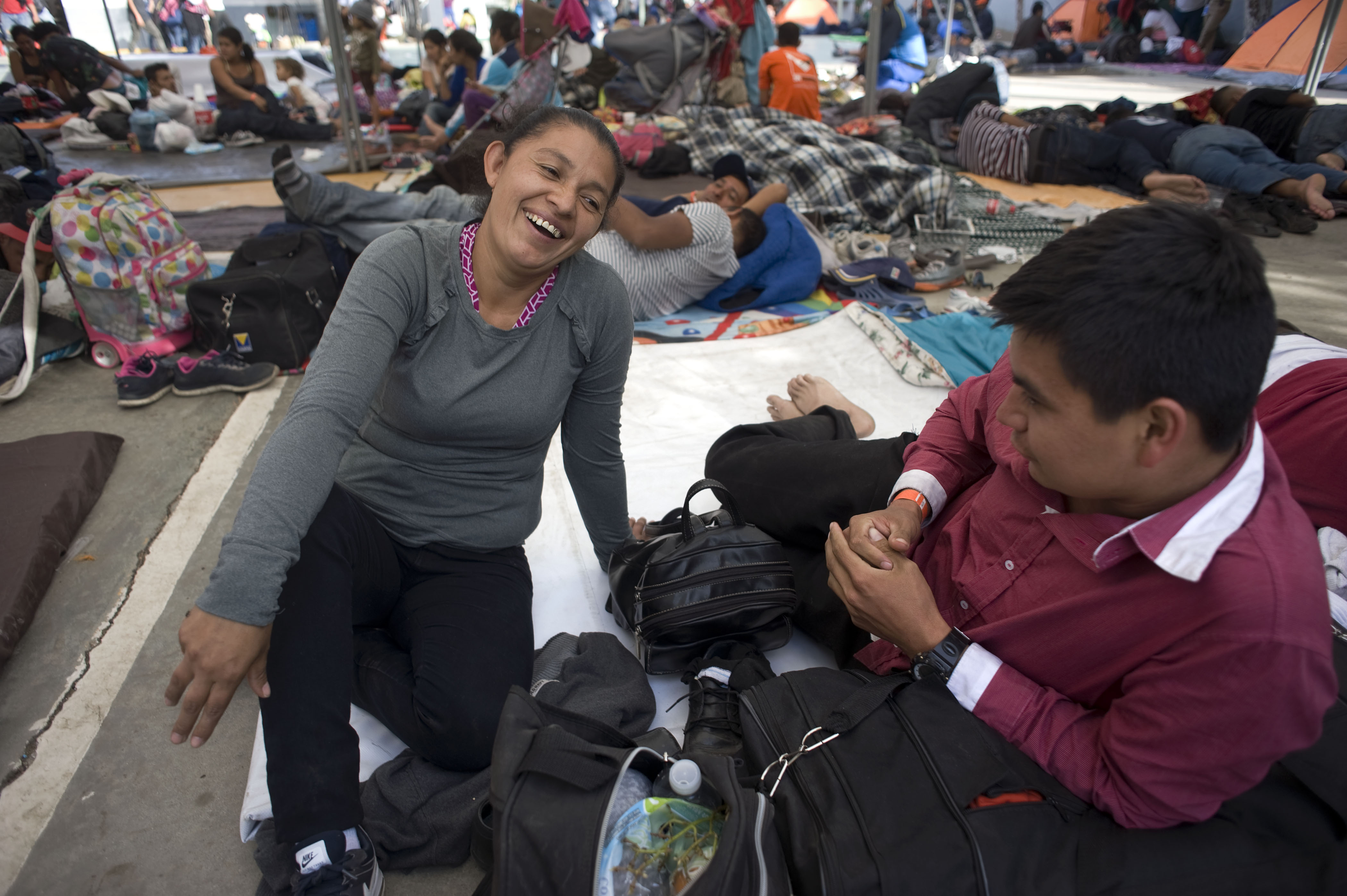
A couple from Honduras relax at a camp at a sports facility in Tijuana, Mexico, set up to for people arriving Nov. 15 in a caravan of Central American migrants at the U.S.-Mexico border. (CNS photo/David Maung)
Crowded living conditions, poverty and months of waiting in uncertainty are the lot of caravan migrants from Central America who are stuck in Tijuana, Mexico, and seeking asylum in the U.S. Despite the hardships, a number of couples are tying the knot.
Presiding at weddings was a much-requested ministry for a team of U.S. Protestant pastors visiting the Mexican city in late November.
"I concelebrated 11 weddings in one week and they were some of the most wonderful weddings I ever blessed," said the Rev. Kaji Dousa, senior pastor of the Park Avenue Christian Church in New York City.
Dousa co-chairs the New Sanctuary Coalition, a New York-based project organizing social services and legal accompaniment for caravan migrants in Tijuana. She was one of a half-dozen clergy who traveled to the city on behalf of the coalition to establish partnerships with local groups aiding the immigrants.
The Protestant pastors concelebrated weddings at the request of Al Otro Lado (AOL), a non-profit organization working with migrants on both sides of the Tijuana and San Diego, California border. AOL's website reports that many couples in the caravan, despite years of committed partnership and children, never officially married because of poverty, or because they are LGBT. The organization says it has had success keeping migrant families together with marriage documentation.
"We were marrying all faith traditions. We celebrated with a blessing and religious certificate. It was beautiful," said the Rev. Eduardo Fabian Arias, an Argentina born pastor at St. Peter's Lutheran Church in New York City. Arias said he concelebrated between three and four weddings a day during his weeklong November visit.
The marriage ceremonies began at 3 p.m. at AOL's office in Tijuana, following the legal clinic offered earlier in the afternoon. AOL staff provided a simple, interfaith liturgy and inexpensive rings for the couples. Attending clergy were encouraged to bring flowers to add a measure of beauty to the wedding space.
Written in Spanish and English, AOL's Border Wedding Liturgy would be familiar to anyone who has attended a wedding in the Judeo-Christian tradition. The one Scriptural reading is a popular passage from the Song of Solomon. During the exchange of vows, couples promise to love and remain faithful to one another "in joy and sadness, in sickness and in health, in wealth and poverty," and to care for one another all the days of their lives until "separated by death," a commitment which must feel especially poignant given the uncertain futures many face.
Thousands of migrants, predominantly Hondurans, poured into the city in early November after a two month trek across Central America and Mexico. Many camped out in a sports complex near the San Ysidro Port of Entry into the U.S. where they hoped to cross and file asylum claims.
But the Trump administration is requiring migrants who pass through Mexico seeking asylum in the U.S. to remain in Mexico while their application is pending. Immigrants who show up at the San Ysidro border crossing have their names put on a list and are told to return when their number is called. The policy, locally known as "listing," means thousands of migrants are waiting weeks, if not months, in Tijuana, a city ill-equipped to accommodate them.
In early December, the Mexican government opened a shelter some 20 kilometers from the port of entry. Many migrants, weary from the hardships of outdoor camping, relocated there, but hundreds remained at the sports complex until that site was forcibly dismantled in mid-December.
"Now in Tijuana, the situation is an emergency situation. For two months, there are immigrants demanding many things — food, clothes. Many people are sick. Some with pneumonia. … It's a very complicated situation … a humanitarian problem," said Arias.
Amid the complexity and chaos are the weddings. Dousa, who returned to Tijuana in early January for more organizing on behalf of the New Sanctuary Coalition, reports they are still happening.
[Claire Schaeffer-Duffy, a freelance writer, lives and works at the Sts. Francis and Therese Catholic Worker Community in Worcester, Massachusetts. She has been contributing to National Catholic Reporter since 1999.]
Advertisement








